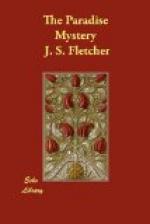“Well, I don’t know that there is anything so very odd about it, after all,” replied the other man. “He may have picked up that old book for one of many reasons that could be suggested. No—I read all that case in the papers, and I wasn’t so much impressed by the old book feature of it. But I’ll tell you what—there was a thing struck me. I know this Barthorpe district—we shall be in it in a few minutes—I’ve been a good deal over it. This strange man’s name was given in the papers as John Braden. Now close to Barthorpe—a mile or two outside it, there’s a village of that name—Braden Medworth. That’s a curious coincidence—and taken in conjunction with the man’s possession of an old book about Barthorpe—why, perhaps there’s something in it—possibly more than I thought for at first.”
“Well—it’s an odd case—a very odd case,” said the first speaker. “And—as there’s ten thousand pounds in question, more will be heard of it. Somebody’ll be after that, you may be sure!”
Bryce left the train at Barthorpe thanking his good luck—the man in the far corner had unwittingly given him a hint. He would pay a visit to Braden Medworth—the coincidence was too striking to be neglected. But first Barthorpe itself—a quaint old-world little market-town, in which some of even the principal houses still wore roofs of thatch, and wherein the old custom of ringing the curfew bell was kept up. He found an old-fashioned hotel in the marketplace, under the shadow of the parish church, and in its oak-panelled dining-room, hung about with portraits of masters of foxhounds and queer old prints of sporting and coaching days, he dined comfortably and well.
It was too late to attempt any investigations that evening, and when Bryce had finished his leisurely dinner he strolled into the smoking-room—an even older and quainter apartment than that which he had just left. It was one of those rooms only found in very old houses—a room of nooks and corners, with a great open fireplace, and old furniture and old pictures and curiosities—the sort of place to which the old-fashioned tradesmen of the small provincial towns still resort of an evening rather than patronize the modern political clubs. There were several men of this sort in the room when Bryce entered, talking local politics amongst themselves, and he found a quiet corner and sat down in it to smoke, promising himself some amusement from the conversation around him; it was his way to find interest and amusement in anything that offered. But he had scarcely settled down in a comfortably cushioned elbow chair when the door opened again and into the room walked old Simpson Harker.
CHAPTER VIII
THE BEST MAN
Old Harker’s shrewd eyes, travelling round the room as if to inspect the company in which he found himself, fell almost immediately on Bryce—but not before Bryce had had time to assume an air and look of innocent and genuine surprise. Harker affected no surprise at all—he looked the astonishment he felt as the younger man rose and motioned him to the comfortable easy-chair which he himself had just previously taken.




